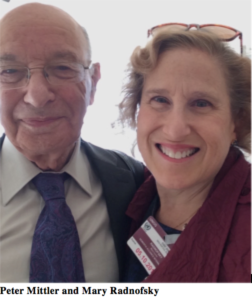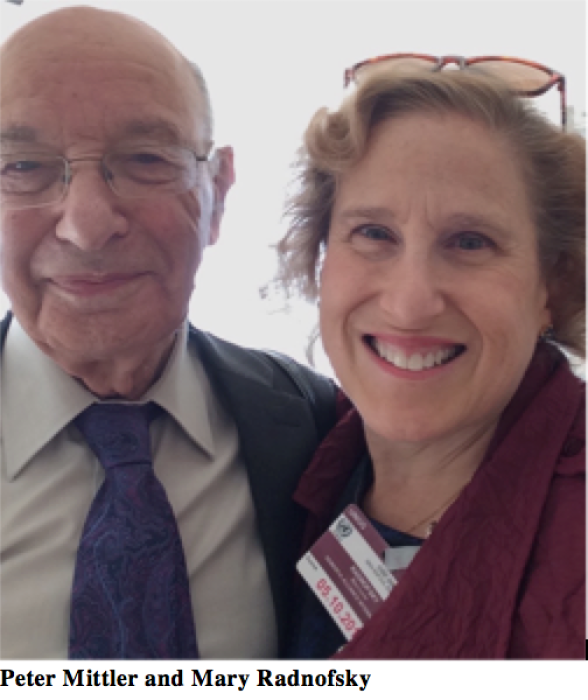My Impressions of the United Nations, Human Rights Council, and Social Forum at the Palais des Nations in Geneva, 2016.
by Mary L. Radnofsky.
Thank you to Mary and Peter for representing Dementia Alliance International members, and all people with dementia so well.
 "The United Nations – It’s one of the hallowed halls of peace we learned about in history books. But there I was, at the UN Human Rights Council for the Social Forum, October 3-5, 2016 with DAI Human Rights Advisor, Peter Mittler.
"The United Nations – It’s one of the hallowed halls of peace we learned about in history books. But there I was, at the UN Human Rights Council for the Social Forum, October 3-5, 2016 with DAI Human Rights Advisor, Peter Mittler.
Most Americans think of the UN as being in New York, but it also has an important regional presence in Addis Ababa, Bangkok, Santiago, and Geneva, where we practiced our best Swiss French in buses and restaurants, and met with representatives of Member States and other Non-Governmental Organizations to discuss the Convention on The Rights of Persons With Disabilities (CRPD) – in every variant of English you can imagine.
To a baby-boomer like myself, the UN is a place of almost mythical significance, where post-World War II leaders came and sat, side by side, to listen and speak to one another, to try and understand social, economic, political, and other constructed problems that have bitterly divided humanity. That is why, under the inspiring leadership of Eleanor Roosevelt, the 1948 General Assembly of the UN adopted the Universal Declaration of Human Rights, which became the launch pad for later Conventions, including the CRPD.
Despite my childhood imaginings, I realize the UN is not magical, but rather a civilized place where persistent, hard-working people (whose names may never be known) have found common ground outside their geographic boundaries for the purpose of helping each other get along and find a better quality of life.
From around the world, people come to the UN speaking dozens of different languages. In this modern Tower of Babel, we all have a “shared disability.” It is, in fact, inherent in the very nature of humanity – linguistic and cultural divergence.
Such a disability could have forever prevented us from communicating ideas across borders. Yet through ongoing accommodation (e.g. the UN simultaneous translation, sign language, and closed-captioning system), we’ve learned to understand each other, with a little extra effort. But we also need some good will to interpret subtle concepts and cultural sensitivities in translation, because it’s not always easy to understand how someone else perceives the world.
In my brief time at the UN, though, I rediscovered in many people some of the fundamental truths that seem to easily cross national and linguistic boundaries, and define the human race. People proudly “admitted” that we can’t succeed alone, because we’re social creatures; we need each other. We need to feel useful and appreciated. We want to take care of one another because we are One. Yet we are also individuals, and we are defined, in part, through our unique relationships with each other. It was the best hope for humanity I’ve ever seen.
This year’s Social Forum included representatives of the 167 Member States officially having ratified the CRPD (not including the USA, unfortunately, but I’m going to work on that). Now that DAI is an Associate Member of the International Disability Alliance (IDA), we can advocate at the UN for including persons with dementia in any accommodations discussed for people with disabilities. This gives us an important, global platform from which to speak the truth about living with dementia, and how we want our governments to support us.
Peter and I both took the opportunity to ask questions and make comments at plenary and side sessions, to ensure that the voice of people with dementia was heard. From the number of positive responses to our interventions (most of which were recorded on the UN’s webcamTV, so see the links below), I think our voices were heard. Here’s the context of what we discussed.
Monday, October 3, 2016
As with most long-standing organizations, there were many formal, official speeches at this conference. For starters, we heard the President of the UN Human Rights Council, the UN High Commissioner for Human Rights, and Colin Allen, who is Chair of the International Disability Alliance (IDA). Mr. Allen communicated with sign language, and through his interpreter, explained that 80% of people with disabilities worldwide live in poverty, so he urged states to empower us all to eradicate it. While all speakers cited human rights as the basis, Mr. Allen specifically called for “Humanity, by the people, for the people, and with the people.”
It is an especially compelling argument these days, as we continue to witness acts of atrocious inhumanity not only in war zones, but in so-called “developed” countries, some of which still institutionalize people with disabilities in horrible conditions.
Session: Embracing Diversity & Awareness Raising
Professor Anna Lawson, Disability Studies Director in Leeds, England, spoke of the need to conduct research to provide evidence for reforming government policies. She acknowledges the importance of statistics, but more importantly, realizes the need for qualitative data that can reveal truths about environments that don’t lend themselves to easy classification. She also understands that qualitative methods can explain WHY problems exist, and reveal how marginalized people live in rural, remote locations, or behind institution walls. They don’t communicate in the way people usually do, in part because they’re children, elderly, or people with dementia. She seems to really understand QUALITY OF LIFE issues.
Catalina Devandas Aguilar, UN Special Rapporteur on the Rights of Persons with Disabilities, and herself a wheelchair user, explained that in communities and in the media, there are relatively few, and mostly mistaken images of persons with disabilities.
She said we need to make a paradigm shift; we are under-represented in movies, TV, and in research, for example. To bring about change, we must be included, and this debate must be taken beyond the disability community; it must be viewed on the human rights level of the global stage. She is also concerned with the rights of women, children, and the elderly, and recognizes that many people with dementia are often part of other able and non-disabled communities that already suffer discrimination for different reasons, so their human rights must be protected from all angles.
Peter spoke about the need for Member States to include people with dementia in the implementation of the CRPD. (See Peter’s comments on UN WebTV; click on the link and advance the Time slide indicator to 44:32. http://webtv.un.org/search/persons-with-disabilities-and-human-diversity-social-forum-2016/5152740834001.)
I spoke (ok, nervously at first, so forgive the trembling in my voice!) to discuss the importance of ethnographic research using evolving methodology, not just pre-determined checklists based on a medical model, to investigate the subculture of dementia that exists within every society. (See Mary’s comments on UN WebTV; click on the link and advance the Time slide indicator to 47:46 http://webtv.un.org/search/accessibility-and-non-discrimination-social-forum-2016/5152740831001.)
I will describe the next set of sessions in coming blogs, and include more photos. If you’d like more details, feel free to contact us at [email protected] or go to UN WebTV to watch the whole Social Forum yourself. It’s broken down into sessions, so you can start here, if you like. (http://webtv.un.org/search/opening-session-social-forum-2016/5152740796001)
The Best is Yet to Come!"
Mary
